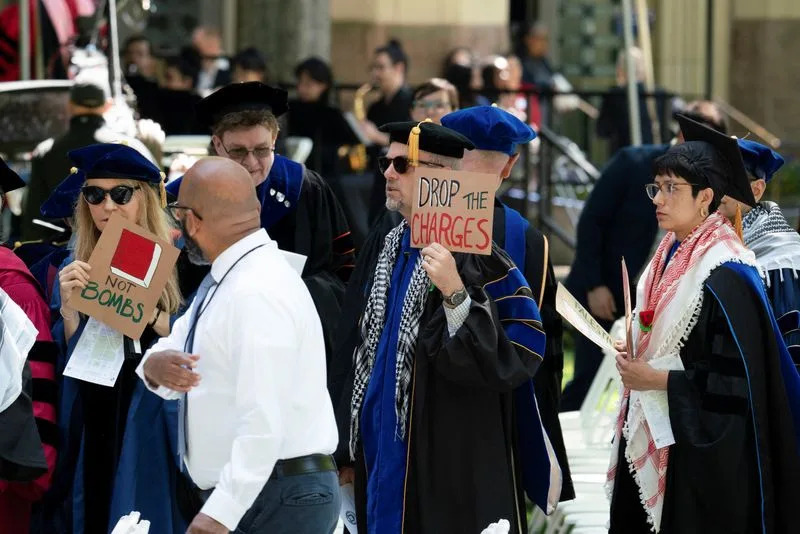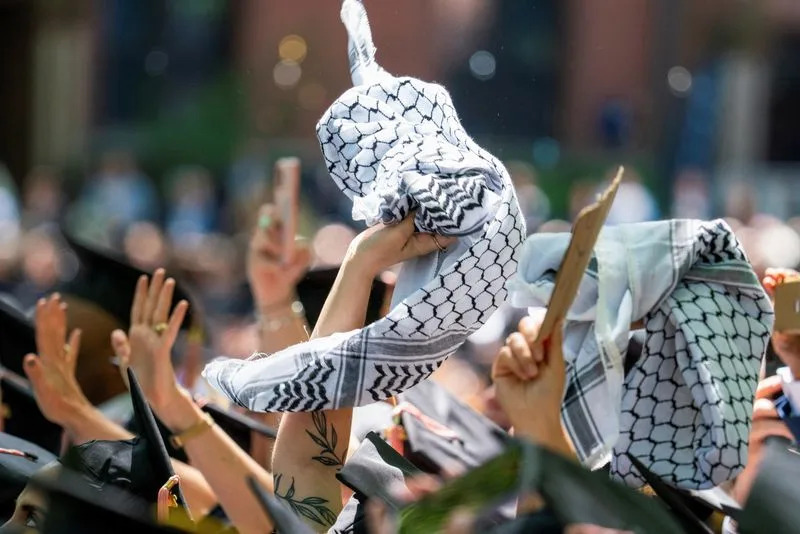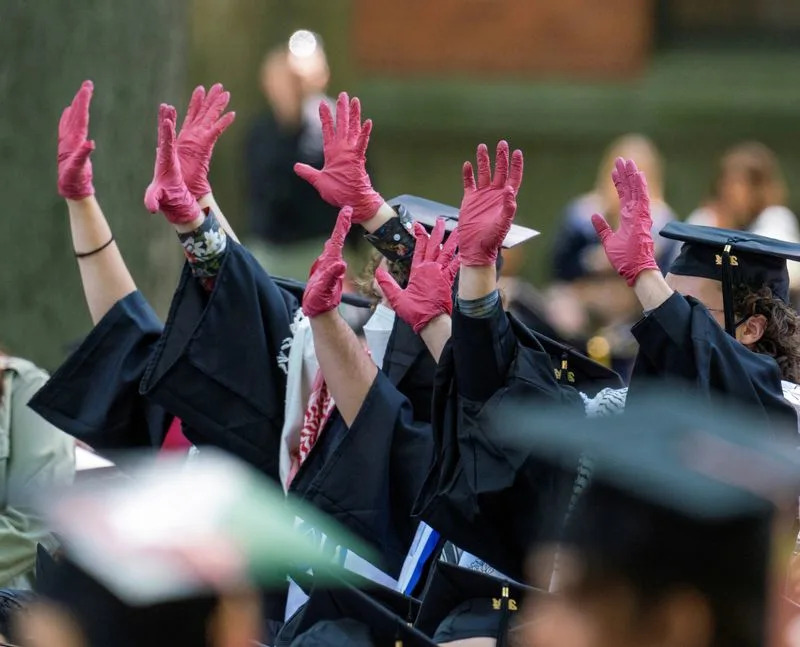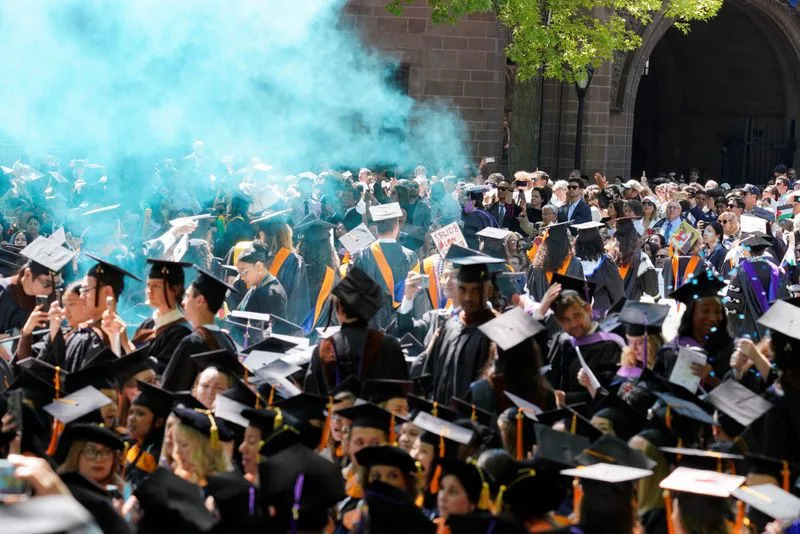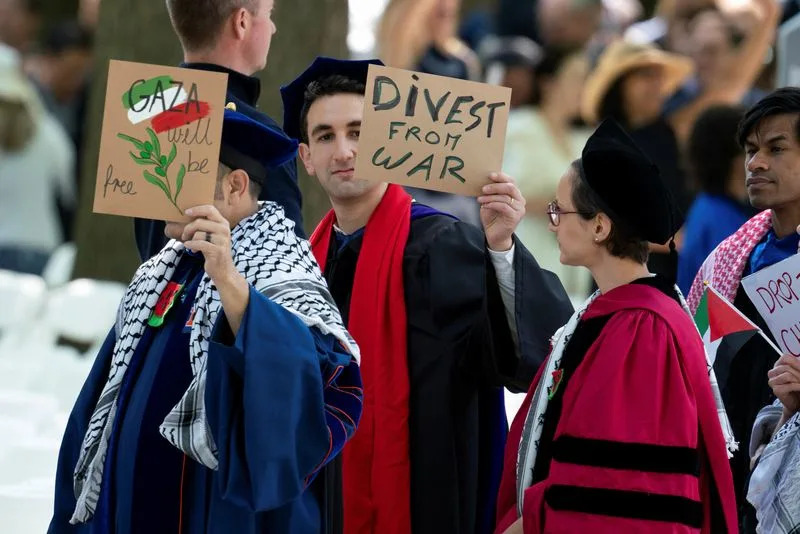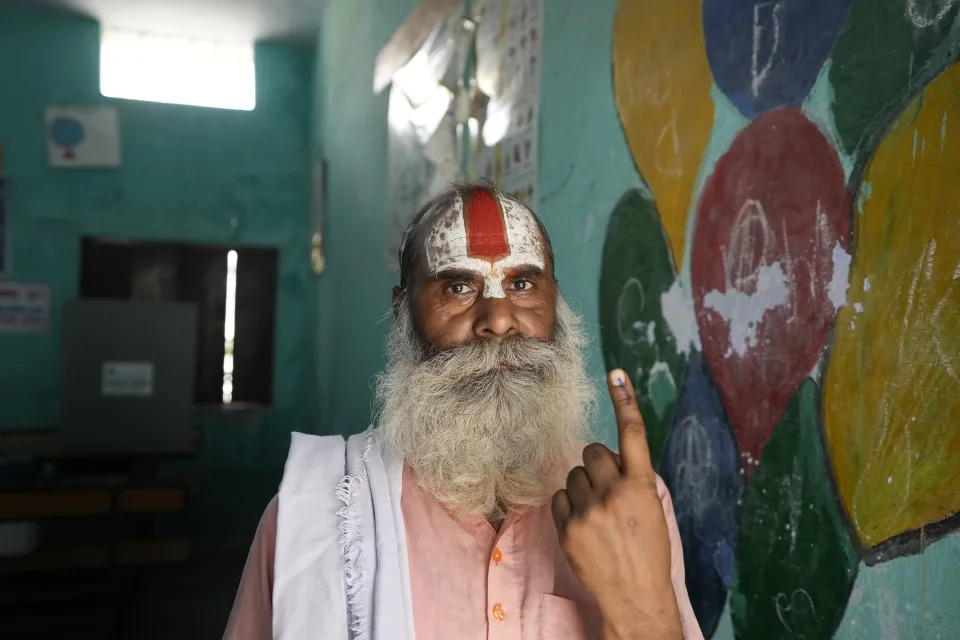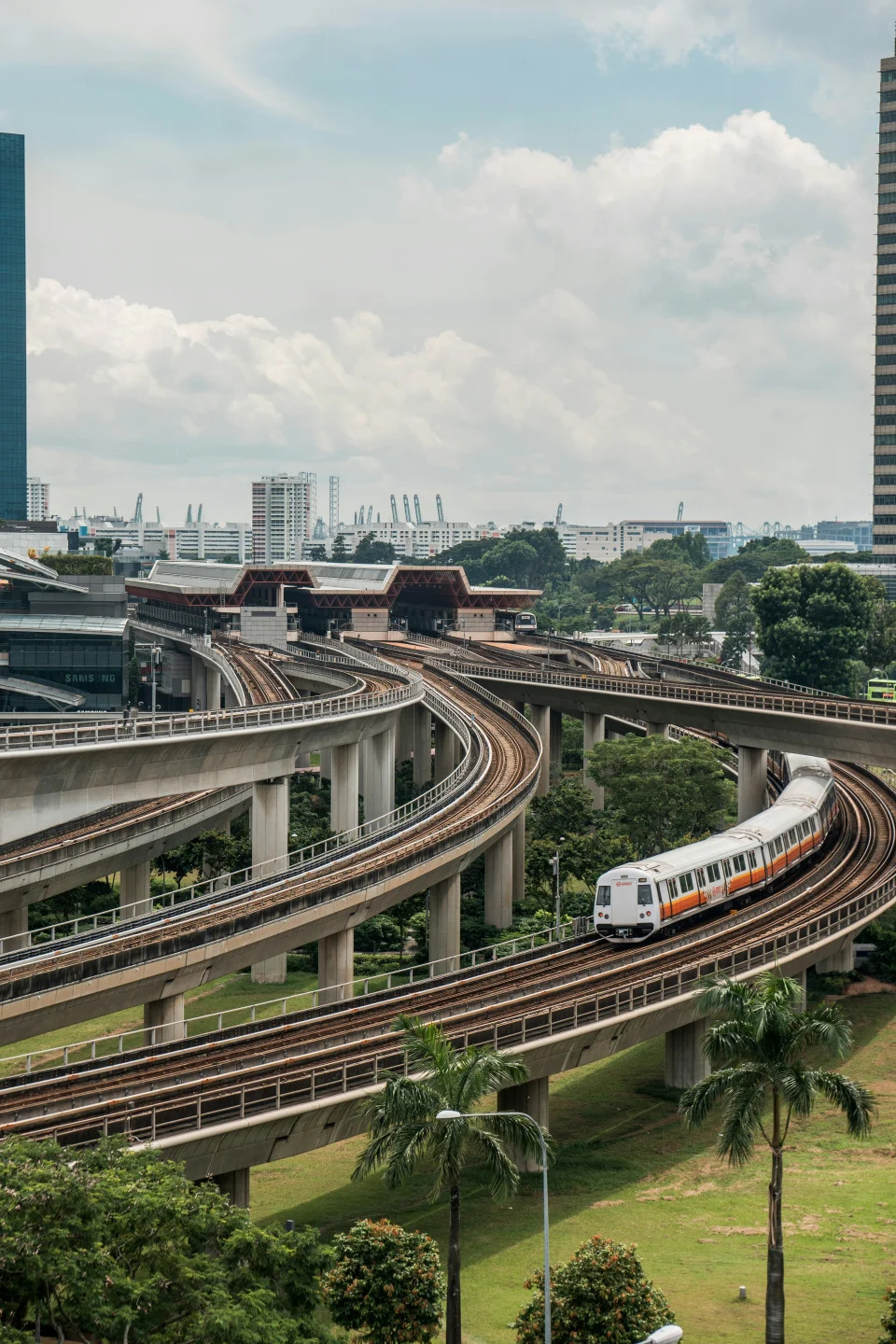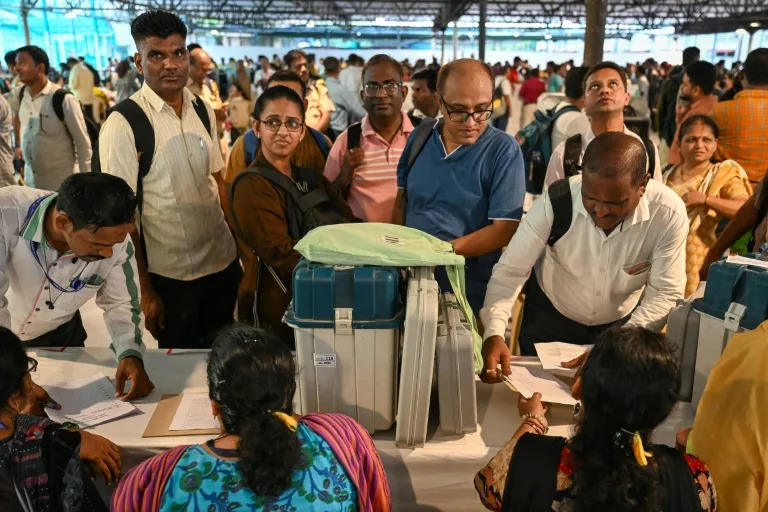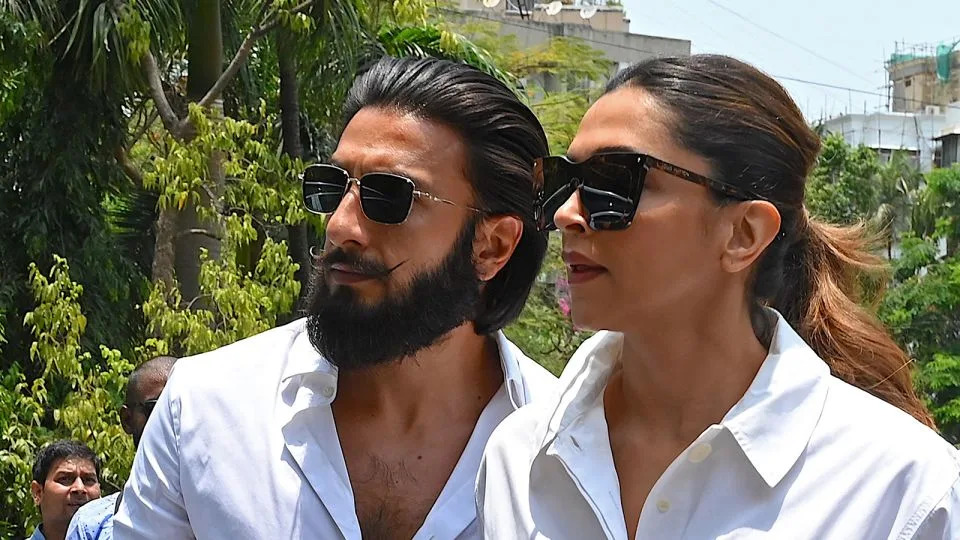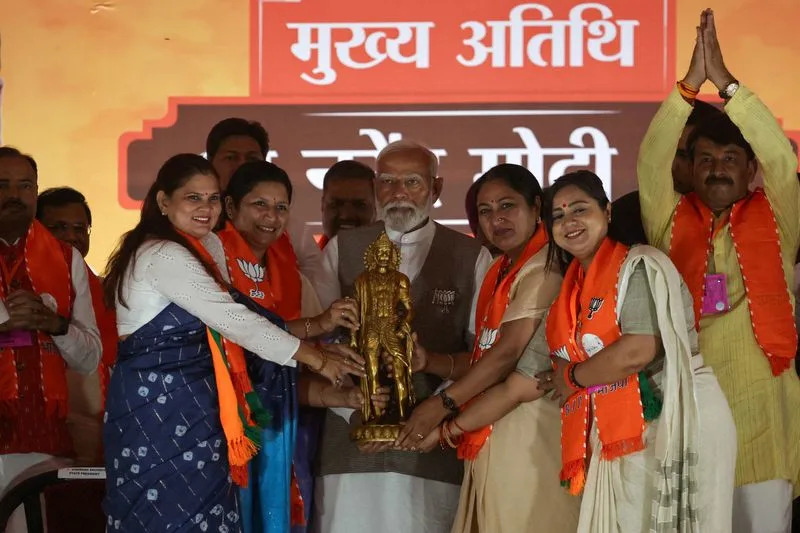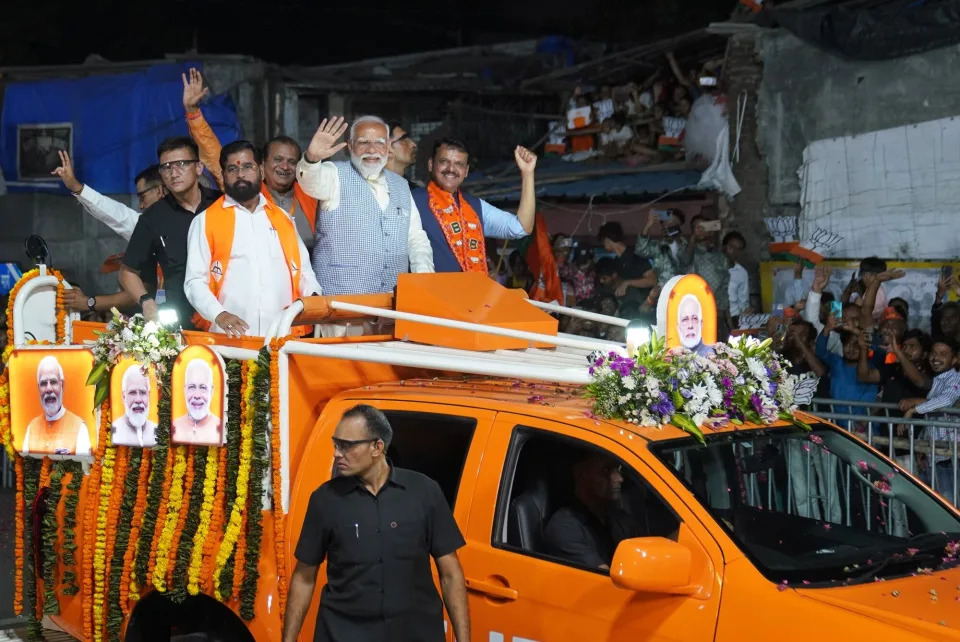Mike Bedigan
Mon, May 20, 2024
Angry TikTok critics who accused Amal Clooney of being “too busy” to speak out publicly about the war in Gaza were proved ironically somewhat correct on Monday, after it was revealed that she had been instead secretly working with the International Criminal Court for an arrest warrant against the Israeli prime minister for possible war crimes.
For months, pro-Palestine social media users have been furious that Ms Clooney, an international human rights lawyer and wife of actor George, had not made public statements on the crisis in Gaza, declaring that she was a “disappointment.” Since the Met Gala, a mass unfollowing and blocking of celebrities who had not spoken out about the atrocities has been underway, dubbed #Blockout2024, with millions of people unfollowing influencers such as Kim Kardashian and Taylor Swift.
Then on Monday, Ms Clooney published an expert report supporting ICC calls for arrest warrants for Benjamin Netanyahu, as well as several Hamas leaders, over alleged war crimes. She also issued a statement saying that she did not provide “running commentary” on her work, which obviously had to remain secret due to the delicate legal nature of her work — but that hadn’t stopped social media from its own.
On TikTok, one woman accused her in January of “turning her back on the Palestinian cause” and caring more about her fashion industry endeavors and “celebrity status” than justice in the Middle East.
“Amal Clooney is nowhere to be found… this broad actually said her caseload was full,” said one user, in a video posted in December. “She’s as bad an actor as her husband... Your name means ‘hope’ — guessing you hoped we’d forget about you huh?” The video has since been viewed over 75,000 times.

Amal Clooney, international human rights lawyer and wife of Hollywood star George Clooney, had been criticised online for her perceived lack of comment on the ongoing conflict in the Middle East (Alberto Pezzali/Invision/AP)
“She’s another one that bites the dust badly,” said another user, in a video in February. “If a Lebanese… who has made it her life’s work to defend people against human rights abuses, can’t bring herself to say anything publicly… it really screams the question ‘is her Hollywood status really more important to her than saying something?’”
Ms Clooney is a British barrister born to Lebanese parents, and her maternal grandmother had Palestinian roots. In an online statement published Monday, Ms Clooney explained how she’d gotten involved in looking into possible war crimes in Gaza: “More than four months ago, the Prosecutor of the International Criminal Court asked me to assist him with evaluating evidence of suspected war crimes and crimes against humanity in Israel and Gaza.
“I agreed and joined a panel of international legal experts to undertake this task. Together we have engaged in an extensive process of evidence review and legal analysis including at the International Criminal Court in The Hague.”
She added: “My approach is not to provide a running commentary of my work but to let the work speak for itself. I hope that witnesses will cooperate with the ongoing investigation. And I hope that justice will prevail in a region that has already suffered too much.”
Following the statements, some in the TikTok community pointed out that the “dragging” of Ms Clooney online had perhaps been “a little bit too much”.
In a video titled “Maybe a lot of you need to apologize to Amal Clooney now?” one user highlighted that Ms Clooney had been doing “incredibly important work” behind the scenes for the ICC, which meant she could not comment publicly.
“I know it’s really easy to think that speaking out is everything but when it comes to international law… speaking out is for people who can… and I think we have to just be a little bit mindful that it doesn’t always work like that for everyone,” the user said.
Earlier this month social media users called out celebrities for perceived inaction over the war in Gaza, staging a “blockout” to pressure the stars to take a stand. Ms Clooney was not specifically targeted in the blockout, but social media users have condemned online attacks on Ms Clooney on X, formerly known as Twitter.
“A timely reminder that performative activity on social media is not ‘action’,” wrote one user. “Amal Clooney has been dragged continuously for the past few months for supposedly being silent on Gaza. She was diligently doing her actual job and making a tangible difference in the real world.”
Amal Clooney supports ICC’s decision to seek arrest warrants against Israeli and Hamas leaders
Tara John, CNN
Mon, May 20, 2024
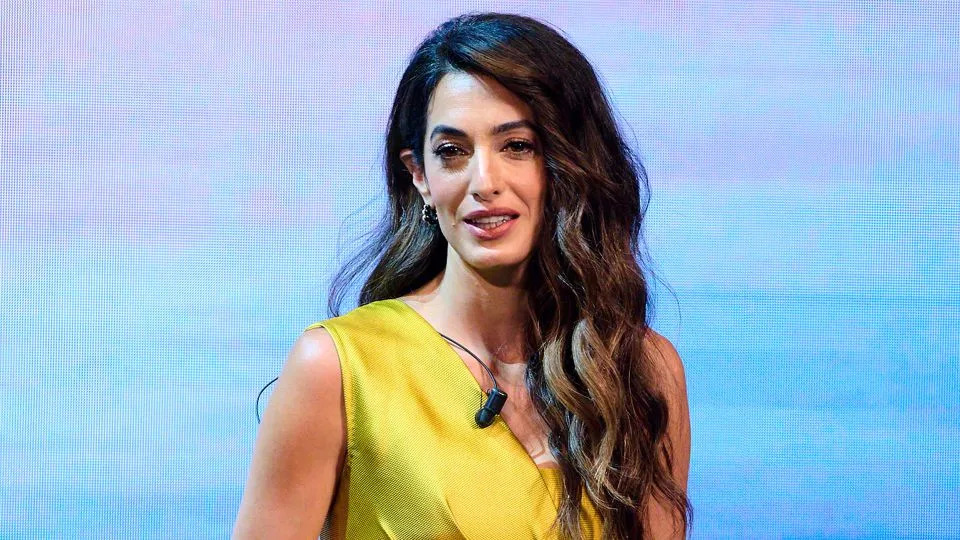
Human rights attorney Amal Clooney is among a group of legal experts who advised the International Criminal Court (ICC) prosecutor to seek arrest warrants against the top leaders of Israel and Hamas.
The panel was convened by the ICC prosecutor Karim Khan and tasked to review the evidence and legal analysis underpinning his application for warrants against three Hamas leaders and two Israeli politicians, including Prime Minister Benjamin Netanyahu.
It issued a detailed legal report on Monday, which said the panel found “reasonable grounds to believe” that the individuals named in the arrest warrants have committed war crimes or crimes against humanity.
Clooney, who has represented victims of mass atrocities, faced online criticism prior to her announcement for not speaking about Israel’s siege on Gaza. In a statement shared on her Clooney Foundation for Justice website on Monday, she explained how she had found herself advising Khan.
“More than four months ago, the prosecutor of the International Criminal Court asked me to assist him with evaluating evidence of suspected war crimes and crimes against humanity in Israel and Gaza,” the statement said. “I agreed and joined a panel of international legal experts to undertake this task.”
She said the panel’s findings were “unanimous” despite their diverse backgrounds. “I served on this panel because I believe in the rule of law and the need to protect civilian lives. The law that protects civilians in war was developed more than 100 years ago and it applies in every country in the world regardless of the reasons for a conflict,” Clooney said in the statement.
The eight-person legal panel consisted of renowned legal experts, including Theodor Meron, former President of the International Criminal Tribunal for the former Yugoslavia, and Lord Justice Fulford, a former ICC judge. They “unanimously determined” that the court had jurisdiction over crimes committed in Palestinian territories and by Palestinian nationals, Clooney’s statement wrote.
The panel also was unanimous in concluding that “Hamas leaders Yahya Sinwar, Mohammed Deif and Ismail Haniyeh have committed war crimes and crimes against humanity, including hostage-taking, murder and crimes of sexual violence.”
Clooney’s statement added there was also “reasonable grounds to believe” Netanyahu and “Israeli Defense Minister Yoav Gallant have committed war crimes and crimes against humanity including starvation as a method of warfare, murder, persecution and extermination.”
A panel of ICC judges will now consider Khan’s application for the arrest warrants.
Both Hamas and Israeli politicians condemned the arrest warrants, with Netanyahu calling it a “travesty of justice” and an “outrageous decision” that “creates a twisted and false moral equivalence between the leaders of Israel and the henchmen of Hamas.”
The application for warrants marks the first time the ICC has targeted the top leader of a close ally of the United States. Israel and the US are not members of the ICC. However, the ICC claims to have jurisdiction over Gaza, East Jerusalem, and the West Bank after Palestinian leaders formally agreed to be bound by the court’s founding principles in 2015.
The Biden administration on Monday forcefully denounced the ICC’s move, with President Joe Biden saying in a statement: “Whatever this prosecutor might imply, there is no equivalence – none – between Israel and Hamas.”
Clooney, who is a barrister at Doughty Street Chambers in London and an adjunct professor at Columbia Law School, is married to the actor George Clooney. Alongside her husband, she co-founded the Clooney Foundation for Justice, which gives free legal support to victims of abuses of power, according to its website.
She has represented Yazidi victims of genocide “in the only three genocide cases against ISIS members in the world,” according to the website. She also was counsel to victims of genocide in Sudan’s Darfur and “helped to secure freedom for political prisoners around the world including journalists and opposition figures.”
CNN’s Ivana Kottasová contributed to this report.
Amal Clooney Approved War Crime Arrest Warrant for Benjamin Netanyahu
Dan Ladden-Hall
Mon, May 20, 2024
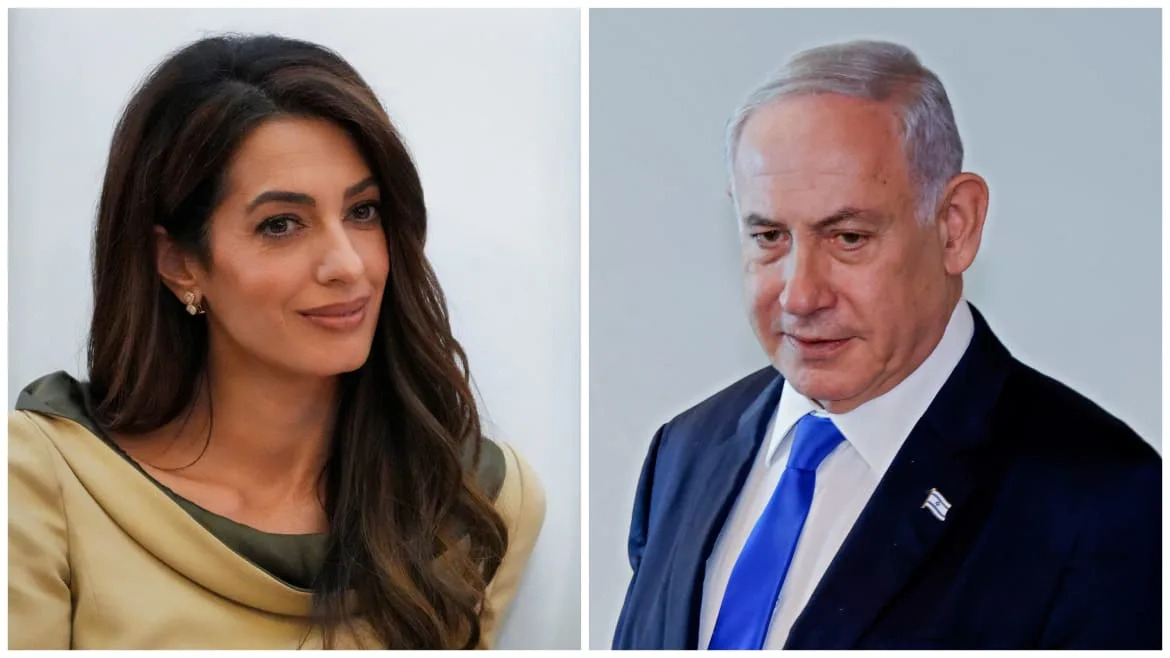
Kena Betancur/Getty Images and Reuters/Nic Bothma
The International Criminal Court’s prosecutor on Monday said that he has requested a warrant for the arrest of Israeli Prime Minister Benjamin Netanyahu, his Defense Minister Yoav Gallant, and three Hamas leaders.
Karim Khan, the prosecutor, said he is filing the application for the warrants against Netanyahu and Gallant for war crimes and crimes against humanity committed in Gaza. The warrants for the Hamas leaders—Yahya Sinwar, Mohammed Diab Ibrahim Al-Masri, and Ismail Haniyeh—relate to the Oct. 7 attacks in southern Israel and the subsequent treatment of the hostages kidnapped during the assault.
The warrant applications will now be considered by a panel of ICC judges. The requests alone are significant, however, with the court targeting the leader of one of the U.S.’ close allies for the first time, according to CNN.
A group of lawyers based in the U.K.—including Amal Clooney—said they had been approached by Khan to advise on the warrant applications and had given their unanimous approval.
“The Panel... unanimously agrees that the evidence presented by the prosecutor provides reasonable grounds to believe that Netanyahu and Israel’s minister of defence Yoav Gallant have committed war crimes and crimes against humanity,” Clooney and the other legal advisors wrote in an op-ed published by the Financial Times.
In a statement, Khan said evidence collected and examined by his office gave him “reasonable grounds to believe” that Netanyahu and Gallant “bear criminal responsibility” for crimes including the starvation of civilians as a method of warfare, intentionally directing attacks against a civilian population, and “extermination and/or murder.”
The Hamas leaders are also suspected of extermination and murder, with Khan further seeking arrest warrants against the trio for hostage-taking, torture, and “rape and other acts of sexual violence as crimes against humanity.”
Sinwar is the leader of Hamas in Gaza. Al-Masri, commonly known as Mohammed Deif, is the head of the group’s military wing, the Al-Qassam Brigades, while Haniyeh leads the Hamas Political Bureau. Khan said there are reasonable grounds to believe that all three are “criminally responsible for the killing of hundreds of Israeli civilians in attacks perpetrated by Hamas… on 7 October 2023 and the taking of at least 245 hostages.”
Khan also said that his office is of the view that they “have through their own actions, including personal visits to hostages shortly after their kidnapping, acknowledged their responsibility for those crimes.” He said he’d heard from survivors of the Oct. 7 attacks about “how the love within a family, the deepest bonds between a parent and a child, were contorted to inflict unfathomable pain through calculated cruelty and extreme callousness.” “These acts demand accountability,” he said.
The prosecutor also said there are grounds to believe hostages taken during the attack have been “kept in inhumane conditions, and that some have been subject to sexual violence, including rape, while being held in captivity.” That suspicion, he said, is based on medical records, documentary evidence, and interviews with victims and survivors.
The allegations against Netanyahu and Gallant, Khan claims, relate to crimes “committed as part of a widespread and systematic attack against the Palestinian civilian population pursuant to State policy.” “These crimes, in our assessment, continue to this day,” he said.
Khan claimed evidence shows that Israel has “intentionally and systematically deprived the civilian population in all parts of Gaza of objects indispensable to human survival” through the siege of the enclave which has prevented essential supplies from entering.
“This took place alongside other attacks on civilians, including those queuing for food; obstruction of aid delivery by humanitarian agencies; and attacks on and killing of aid workers, which forced many agencies to cease or limit their operations in Gaza,” Khan said.
The prosecutor acknowledged that Israel, like all states, has the right to take action to defend its population. “That right, however, does not absolve Israel or any State of its obligation to comply with international humanitarian law,” Khan said, alleging that Israel has sought to achieve its military goals through “criminal” means including intentionally causing death, starvation, and suffering.
“Today we once again underline that international law and the laws of armed conflict apply to all,” Khan said. “No foot soldier, no commander, no civilian leader—no one—can act with impunity. Nothing can justify wilfully depriving human beings, including so many women and children, the basic necessities required for life. Nothing can justify the taking of hostages or the targeting of civilians.”
Neither Israel nor the U.S. are members of the ICC. If the warrants are granted, however, those targeted could face arrest if they travel to any of the 124 nations which are—including most of Europe.
Netanyahu has not immediately responded to the application. Last month, when reports emerged that the ICC could seek warrants against Israel’s top officials over war crimes, Netanyahu said such warrants “would be an outrage of historic proportions.”
The Daily Beast.
How Amal Clooney advised ICC prosecutor to seek arrest warrants for Netanyahu, Hamas leaders
Gabriella Ferrigine
Mon, May 20, 2024
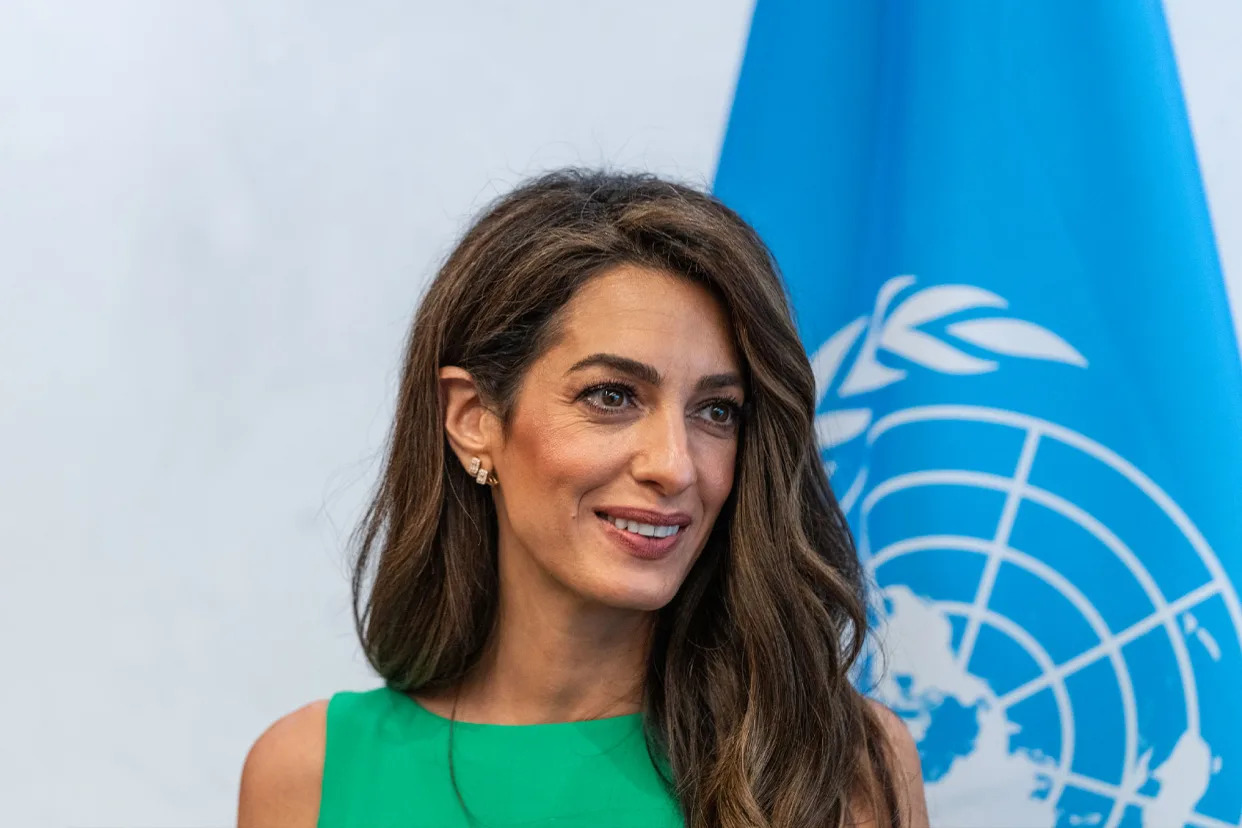
Amal Clooney Lev Radin/Pacific Press/LightRocket via Getty Images
Amal Clooney was among a group of lawyers based in the U.K. to advise the International Criminal Court’s prosecutor in issuing an arrest warrant for Israeli Prime Minister Benjamin Netanyahu, his Defense Minister Yoav Gallant, and three Hamas leaders — Yahya Sinwar, Mohammed Diab Ibrahim Al-Masri, and Ismail Haniyeh.
Prosecutor Karim Khan said on Monday that the warrants against Netanyahu and Gallant would be in relation to war crimes committed in Gaza, while the warrants for the Hamas leaders would be issued in connection to the Oct. 7 massacre in southern Israel and the subsequent treatment of those taken hostage, as noted by The Daily Beast.
“The Panel . . . unanimously agrees that the evidence presented by the prosecutor provides reasonable grounds to believe that Netanyahu and Israel’s minister of defence Yoav Gallant have committed war crimes and crimes against humanity,” Clooney and other legal advisers wrote in an op-ed published by the Financial Times.
Clooney, who is married to actor George Clooney, is an accomplished human rights lawyer — as one X/Twitter user noted, she has been since "before George came along." Comedians Tiny Fey and Amy Poehler memorably jested at Clooney's legal and ethical accomplishments being overshadowed by her husband's celebrity status at the 2015 Golden Globes awards.
"Amal is a human rights lawyer who worked on the Enron case, was an advisor to Kofi Annan regarding Syria, and was selected for a three-person UN commission investigating rules of war violations in the Gaza strip," Fey said. "So tonight her husband is getting a lifetime achievement award."
Explainer-What happens after ICC prosecutor seeks warrants in Israel-Gaza conflict?
Updated Mon, May 20, 2024
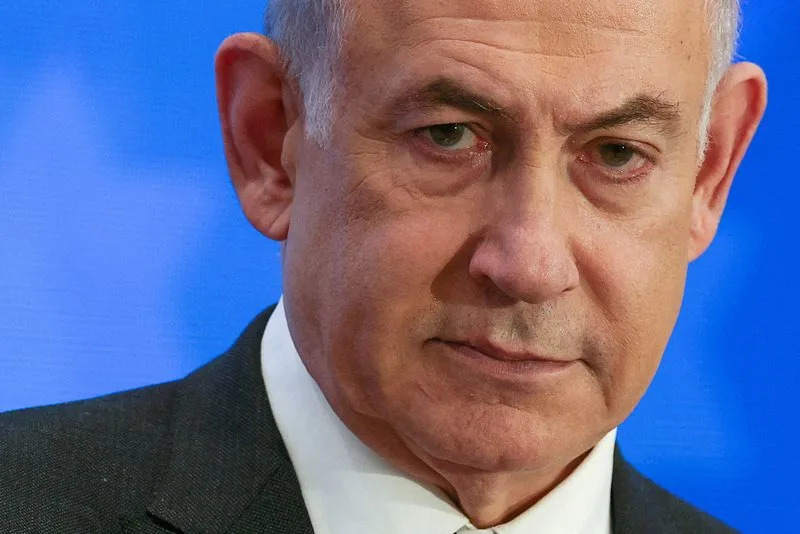
FILE PHOTO: Conference of Presidents of Major American Jewish Organizations, in Jerusalem
By Stephanie van den Berg
THE HAGUE (Reuters) -The International Criminal Court prosecutor's office has requested arrest warrants for Israeli Prime Minister Benjamin Netanyahu and his defence chief, and also for three Hamas leaders for alleged war crimes and crimes against humanity.
Here is a look at what happens next, and how the ICC prosecutor's move might impact diplomatic relations and other court cases focused on Gaza.
WHAT HAPPENS NEXT AT ICC?
Prosecutor Karim Khan's request goes to a pre-trial chamber. The chamber will be composed of three magistrates: presiding judge Iulia Motoc of Romania, Mexican judge Maria del Socorro Flores Liera and judge Reine Alapini-Gansou of Benin.
There is no deadline for judges to decide whether to issue arrest warrants. In previous cases, judges have taken anywhere from just over a month to several months.
If the judges agree there are "reasonable grounds" to believe war crimes or crimes against humanity have been committed, they will issue an arrest warrant. The warrant must name the person, the specific crimes for which an arrest is sought and a statement of facts which are alleged to constitute those crimes.
Judges can amend arrest warrant requests and grant only portions of what the prosecutor is seeking. Charges can also be changed and updated later.
Israeli and Hamas leaders have dismissed allegations of committing war crimes, and representatives of both sides criticised Khan's decision.
WILL NETANYAHU AND THE HAMAS LEADERS BE ARRESTED?
The ICC's founding Rome statute combined with jurisprudence from past cases involving arrest warrants against sitting heads of state oblige all 124 ICC signatory states to arrest and hand over any individual subject to an ICC arrest warrant if they set foot on their territory.
However, the court has no means to enforce an arrest. The sanction for not arresting someone is a referral back to the ICC's assembly of member states and ultimately a referral to the U.N. Security Council.
CAN AN ICC INVESTIGATION OR WARRANT BE PAUSED?
The court's rules allow for the U.N. Security Council to adopt a resolution that would pause or defer an investigation or a prosecution for a year, with the possibility of renewing that indefinitely.
In past cases where a state has ignored its obligation to arrest an individual facing an ICC warrant, they have received a procedural slap on the wrist at most.
Israel or the Palestinian authorities could also formally petition the office of the prosecutor to defer the case because they are investigating or prosecuting the same people for substantially the same alleged criminal acts themselves.
The prosecutor would then need to pause the case and review if the state which requested the deferral is indeed carrying out a genuine investigation. If the prosecutor deems the national investigations are not sufficient, he can apply for judges to reopen the investigation.
CAN NETANYAHU AND HAMAS CHIEF YAHYA SINWAR STILL TRAVEL?
Yes they can. Neither the application for a warrant nor the issuance of an ICC arrest warrant curbs an individual's freedom to travel. However, once an arrest warrant has been issued, they risk arrest if they travel to an ICC signatory state, which may influence their decision-making.
There are no restrictions on political leaders, lawmakers or diplomats from meeting individuals with an ICC arrest warrant against them. Politically, however, the optics of this may be bad.
WILL THIS APPLICATION FOR WARRANTS INFLUENCE OTHER CASES?
Not directly, but perhaps indirectly.
The ICC application is a separate matter to, for example, court cases demanding an arms embargo against Israel or South Africa's attempts at the International Court of Justice to seek a halt to Israel's offensive on Rafah.
If the judges decide there are reasonable grounds to believe Netanyahu and Defence Minister Yoav Gallant are committing war crimes and crimes against humanity in Gaza, it could strengthen legal challenges demanding an arms embargo elsewhere as numerous states have provisions against selling arms to states which might use them in ways that violate international humanitarian law.
(Reporting by Stephanie van den Berg; Editing by Richard Lough and Alison Williams)
Hamas and Israeli leaders may face international arrest warrants. Here’s what that means
Nadeen Ebrahim, CNN
Mon, May 20, 2024

The prosecutor at the International Criminal Court (ICC) is seeking arrest warrants for top Hamas and Israeli figures on charges of war crimes and crimes against humanity over the October 7 attacks on Israel and the subsequent war in Gaza.
If approved by a panel of judges, the arrest warrants would be issued for Israeli Prime Minister Benjamin Netanyahu and Defense Minister Yoav Gallant. Warrants are also being sought for three top Hamas officials: Gaza leader Yahya Sinwar, political chief Ismail Haniyah, and Mohammed Diab Ibrahim al-Masri, the leader of Hamas’ armed wing, who is better known as Mohammed Deif.
Here’s what we know about the ICC cases and what they mean for Israel and Hamas.
How would an arrest warrant affect Netanyahu or Hamas leaders?
The decision to seek arrest warrants doesn’t immediately mean the individual is guilty, but is the first stage in a process that could lead to a lengthy trial.
If the court finds sufficient evidence of crimes, it can summon the suspect to appear voluntarily. The court can also issue an arrest warrant, relying on member countries to make the arrest and transfer the suspect to the ICC.
If the suspect appears before the court, a pre-trial takes place in which the court decides if there is enough evidence for the case to go to trial. Then there is a trial before three ICC judges, in which the prosecution must prove “beyond reasonable doubt” that the individual is guilty of the crimes.
Once a verdict passes, the charged individual may be sentenced to up to 30 years in prison. Under exceptional circumstances, a life sentence can also be given, the court says.
The ICC has so far issued arrest warrants against 42 people, 21 of whom have been detained with the help of member states.
“The immediate problem for Israeli officials under any ICC arrest warrant would be that the court’s 124 member states would be under a legal obligation to arrest such officials if they traveled to any of those 124 countries,” Chile Eboe-Osuji, a former ICC president, wrote this month in Foreign Policy magazine.
“That obligation should not be underestimated,” he said, adding that “just last year, Putin canceled his plans to attend the BRICS summit in South Africa, in the apparent light of Pretoria’s obligation to arrest him.”
Of Hamas leaders for whom arrest warrants are sought, two – Sinwar and Deif – are believed to be in Gaza, while Haniyah resides in Qatar, which is not a signatory to the Rome Statute.
What is the ICC and who can it indict?
Headquartered at The Hague in the Netherlands, the ICC was established in 2002 and is tasked with prosecuting individuals for crimes of genocide, crimes against humanity and war crimes.
Unlike the International Court of Justice (ICJ), the ICC is not an organ of the United Nations and does not prosecute states.
While the ICC is independent of the UN, it is endorsed by the UN’s General Assembly and maintains a cooperation agreement with the UN. When a case is not within the ICC’s jurisdiction, the UN Security Council can refer that case to the ICC, granting it jurisdiction.
The court can investigate alleged crimes committed on the territory, or by a national, of any state that has accepted the court’s jurisdiction by signing the Rome Statute, the treaty that established the ICC. Any member state can ask the ICC’s prosecutor to launch an investigation.
The court has previously issued arrest warrants against high-ranking individuals, including former Sudanese president Omar al-Bashir, Saif Gadhafi, the son of the late Libyan leader Moammar Gadhafi, and most recently, Russian President Vladimir Putin.
Signatory states are obliged to apprehend those facing arrest warrants, but leaders have often sought to evade those warrants, restricting their freedom of movement.
The ICC does not have its own enforcement mechanism and has relied on countries’ support for arrests.
Does the ICC have jurisdiction over Israeli nationals?
Israel’s actions in Gaza were referred to the ICC by five countries – South Africa, Bangladesh, Bolivia, Comoros and Djibouti – in November, calling on the court to investigate the possible crimes of genocide, crimes against humanity and war crimes, among others, in the Palestinian territories, and asked it to determine whether “one or more specific persons should be charged.”
Israel does not recognize the jurisdiction of the ICC as it hasn’t signed the Rome Statute. But that doesn’t mean its citizens cannot be prosecuted by the court.
The court had already been investigating possible crimes committed by Israel since 2014 in Gaza, the occupied West Bank and occupied East Jerusalem. The investigation began in March 2021, and was referred to the court by the Palestinian Authority, which adopted the ICC’s mandate in 2015 as the State of Palestine. The ICC concluded then that it has jurisdiction on the conflict and, “by majority, that the territorial scope of this jurisdiction extends to Gaza and the West Bank, including East Jerusalem.”
That investigation, ICC prosecutor Karim Khan said, “is ongoing and extends to the escalation of hostilities and violence since the attacks that took place on 7 October 2023.”
Remarks by Netanyahu this month pointed to anxiety about the ICC probe. Issuing arrest warrants for Israeli officials would leave an “indelible stain” on the edifice of international law and justice, Netanyahu said, adding that the ICC was “founded as a consequence of the Holocaust” and should not attempt to “undermine” Israel’s fundamental right to self-defense.
The ICC action comes as the International Court of Justice (ICJ), a different court in The Hague, considers a case brought by South Africa in which Israel is accused of committing genocide against Palestinians in the Gaza Strip. Israel recognizes the ICJ.
Israel’s war in Gaza, prompted by the October 7 Hamas attack that killed 1,200 people in Israel and took more than 250 others hostage, has dragged on for nearly eight months.
More than 35,000 people have been killed during Israel’s assault on Gaza, according to Palestinian authorities. Swathes of the territory have been reduced to rubble and more than half of its population of 2.3 million has been internally displaced. Famine has set in in parts of the strip.
Does the ICC have jurisdiction over Hamas?
Palestinian leaders signed up to the Rome Statute in 2015. As such, the ICC has jurisdiction over actors in Gaza and other Palestinian territories and by extension, over actors in those territories, including Hamas.
ICC prosecutor Khan confirmed this in October, saying alleged crimes committed by Israel in Gaza, or by Hamas in Israel, fall under the court’s jurisdiction, Reuters reported.
This means the court can indict Hamas leaders over possible crimes committed against both Israelis and Palestinians in the Gaza Strip.
Shelly Aviv Yeini, head of the international law department at the Israeli Hostage and Missing Families Forum, said the ICC could make Hamas accountable for crimes even if the state of Israel does not recognize the authority of the court.
“We are an NGO, a private entity,” Yeini told CNN earlier, as the families of hostages held by Gaza gathered to submit a complaint against Hamas to the ICC. “We can bring about a claim in the name of the hostages even if the state (Israel) doesn’t recognize its (the ICC’s) jurisdiction.”
ICC prosecutor Khan said Monday he is seeking the warrants “on the basis of evidence collected and examined by my office,” and thanked families of the hostages “for their courage in coming forward to provide their accounts.”
According to Article 15 of the ICC Rome Statue, any individual, group, or organization can file complaints of potential crimes to the court.
A member of the Hamas political bureau, Muhammad Nazzal, told CNN in February that going to the ICC was “a mistake” that would stall negotiations to return the hostages.
“The shortest way to return their prisoners is to complete the ongoing negotiating process,” the Hamas member told CNN at the time.
How have Hamas, Israel and others reacted to the ICC’s action?
Both Hamas and Israeli politicians denounced the ICC’s move.
Hamas said it was an attempt to “equate victims with aggressors by issuing arrest warrants against a number of Palestinian resistance leaders without legal basis.” The militant group said warrant requests for Netanyahu and Gallant had come “seven months late,” referring to the duration of Israel’s war in Gaza.
Israeli politicians across the political spectrum condemned the decision. Foreign Minister Israel Katz called it a “scandalous decision” and an “unrestrained frontal attack on the victims of October 7 and our 128 hostages in Gaza.”
The leader of the opposition, Yair Lapid, called it “a complete moral failure” and said Israel “cannot accept the outrageous comparison between Netanyahu and Sinwar.”
The right-wing minister for National Security, Itamar Ben Gvir, accused the ICC of antisemitism and called for an escalation of attacks against Hamas, while Finance Minister Bezalel Smotrich said: “We have not seen such a show of hypocrisy and hatred of Jews as that of the Hague Tribunal since Nazi propaganda.”
CNN has reached out to the Prime Minister’s office and Defense Ministry.
In the US, meanwhile, President Joe Biden has denounced the ICC prosecutor’s move, calling it “outrageous.”
“Let me be clear: whatever this prosecutor might imply, there is no equivalence — none — between Israel and Hamas,” the president wrote. “We will always stand with Israel against threats to its security.”
Secretary of State Antony Blinken said the US “fundamentally rejects” the ICC prosecutor’s announcement and warned it could “jeopardize” efforts to reach a ceasefire and hostage release agreement.
“We reject the prosecutor’s equivalence of Israel with Hamas. It is shameful. Hamas is a brutal terrorist organization that carried out the worst massacre of Jews since the Holocaust and is still holding dozens of innocent people hostage, including Americans,” Blinken said in a statement.
He questioned “the legitimacy and credibility of this investigation,” and said the US believed the ICC to have “no jurisdiction over this matter.”
The US is not a signatory to the Rome Statute.
CNN’s Jeremy Diamond, Benjamin Brown, Melanie Zanona, Aber Salman and Michael Schwartz contributed to this report.
For more CNN news and newsletters create an account at CNN.com
France backs ICC arrest warrant for Israeli, Hamas leaders
RFI
Tue, May 21, 2024
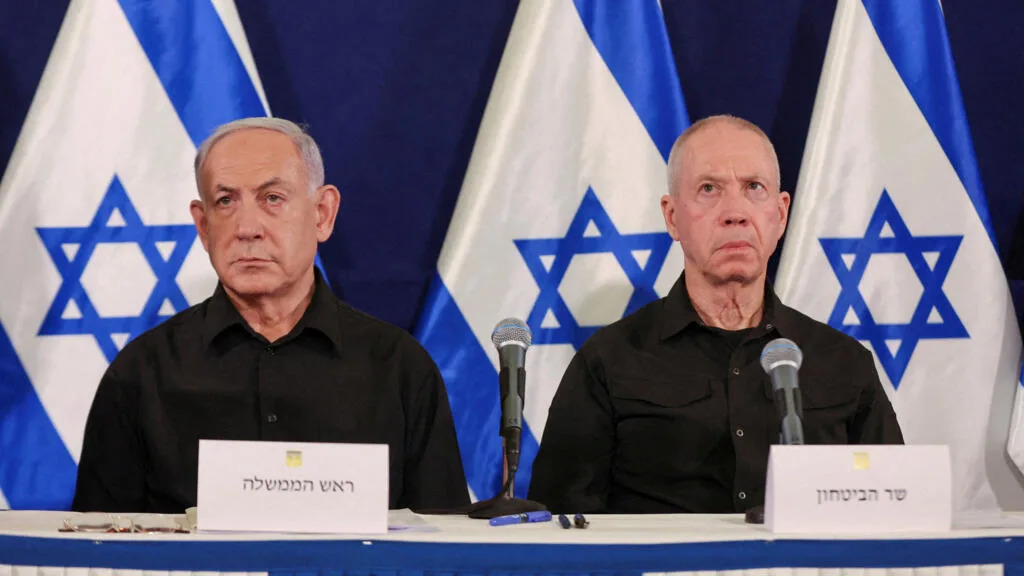
France’s Foreign Ministry has come out in support of the International Criminal Court and its issuing of arrest warrants for Israeli and Hamas leaders for war crimes and crimes against humanity in Gaza and in Israel.
“France supports the International Criminal Court, its independence, and its fight against impunity in all situations,” the Foreign Ministry wrote in a statement published Monday night, following the ICC’s announcement.
Earlier the ICC chief prosecutor Karim Khan said he had issued arrest warrants for three Hamas leaders—Yehia Sinwar, Mohammed Deif and Ismail Haniyeh—for crimes committed in Israel and Gaza on 7 October 2023 and after, including “extermination”, “taking hostages” and “Rape and other acts of sexual violence”.
Khan also issued warrants for Israeli Prime Minister Netanyahu and Defense Minister Yoav Gallant for crimes in Gaza following Hamas’ 7 October attack, including “starvation of civilians as a method of warfare”, “intentionally directing attacks against a civilian population” and “extermination and/or murder”.
The French Foreign Ministry said it “has condemned, as of 7 October, the anti-Semitic massacres perpetuated by Hamas. This terrorist group claimed the barbaric attacks directed at civilians, accompanied by acts of torture and sexual violence that they themselves documented”.
The United States objected to the ICC’s putting Israel and Hamas in the same warrant.
ICC prosecutor seeks arrest warrants for Israel's Netanyahu and Hamas leaders
Updated Mon, May 20, 2024
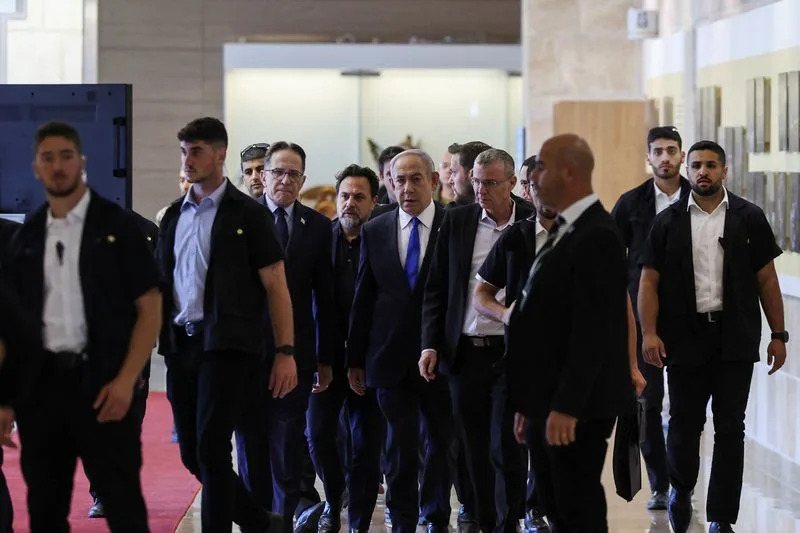
ICC prosecutor seeks arrest warrants for Israel's Netanyahu and Hamas leaders
By Stephanie van den Berg, Anthony Deutsch and Charlotte Van Campenhout
THE HAGUE (Reuters) -The International Criminal Court's prosecutor said on Monday he had requested arrest warrants for Israeli Prime Minister Benjamin Netanyahu, his defence chief and three Hamas leaders over alleged war crimes.
ICC prosecutor Karim Khan said in a statement issued after more than seven months of war in Gaza that he had reasonable grounds to believe the five men "bear criminal responsibility" for alleged war crimes and crimes against humanity.
He said he had applied for an arrest warrant for Israeli Defence Minister Yoav Gallant as well as for Netanyahu. They have overseen Israel's offensive against Hamas in Gaza since the Palestinian militant group's deadly Oct. 7 raid on Israel.
Khan has also applied for arrest warrants for Hamas chief Yahya Sinwar; Mohammed Al-Masri, the commander-in-chief of the military wing of Hamas who is widely known as Deif; and Ismail Haniyeh, head of Hamas' Political Bureau.
A panel of pre-trial judges will determine whether the evidence supports the arrest warrants. But the court has no means to enforce such warrants, and its investigation into the Gaza war has been opposed by the United States and Israel.
Israel and Palestinian leaders have dismissed allegations of war crimes, and representatives for both sides criticised Khan's decision.
"I reject with disgust the comparison of the prosecutor in the Hague between democratic Israel and the mass murderers of Hamas," Netanyahu said, calling the move a "complete distortion of reality."
U.S. President Joe Biden called the legal step "outrageous", while Secretary of State Antony Blinken said it could jeopardize negotiations on a hostage deal and ceasefire.
Senior Hamas official Sami Abu Zuhri said the prosecutor's decision to request warrants for the three Hamas leaders "equates the victim with the executioner". Hamas demanded the arrest warrant request for its leaders be canceled.
NETANYAHU BEARS 'CRIMINAL RESPONSIBILITY'
The ICC issued an arrest warrant for Russian President Vladimir Putin in March 2023 over alleged war crimes in the Ukraine war, but Monday's step was the first time Khan has sought to intervene in the conflict in the Middle East.
"Israel, like all States, has a right to take action to defend its population," Khan said. "That right, however, does not absolve Israel or any state of its obligation to comply with international humanitarian law."
He said crimes against humanity allegedly carried out by Israel were part of "a widespread and systematic attack against the Palestinian civilian population pursuant to State policy."
"These crimes, in our assessment, continue to this day," he said.
Evidence his office collected showed Israel had systematically deprived civilians of "objects indispensable to human survival" including food, water, medicine and energy, he said. Netanyahu and Gallant bore responsibility, he said, for Israel wilfully causing great suffering and for killing as a war crime.
The Hamas leaders face allegations of bearing responsibility for crimes committed by Hamas including extermination and murder, the taking of hostages, torture, rape and other acts of sexual violence.
"Drawing parallels between the leaders of a democratic country determined to defend itself from despicable terror to leaders of a blood-thirsty terror organisation (Hamas) is a deep distortion of justice and blatant moral bankruptcy," Israeli war cabinet minister Benny Gantz said.
WATERSHED EVENT
The ICC is the world's first permanent international war crimes court. It 124 member states are obliged to immediately arrest the wanted person if they are on a member state's territory.
A court of last resort, the ICC steps in only when a state is unwilling or genuinely unable to do so itself. Israel has said alleged war crimes in Gaza are being investigated domestically.
Israel and its main ally the United States are not members of the ICC, along with China and Russia.
Member states have in the past failed to hand over suspects who entered their territory, including Sudanese former President Omar Bashir, wanted since 2005 for war crimes and genocide.
But if warrants are issued against Israeli leaders, court members including nearly all European Union countries could be put in a diplomatically difficult position.
"This is a watershed event in the history of international justice," said Reed Brody, a veteran war crimes prosecutor. "The ICC has never, in over 21 years of existence, indicted a western official. Indeed, no international tribunal since Nuremberg (against representatives of Nazi Germany) has done so."
At least 35,000 Palestinians have been killed in the war in Gaza, according to the enclave's health ministry, and aid agencies have also warned of widespread hunger and dire shortages of fuel and medical supplies.
Some 1,200 people were killed and more than 250 taken hostage in the Hamas-led Oct. 7 rampage, according to Israeli tallies.
(Reporting by Anthony Deutsch, Charlotte Van Campenhout and Stephanie van den Berg; Additional reporting by Humeyra Pamuk in Washington; Editing by Timothy Heritage, Cynthia Osterman and Lincoln Feast.)
